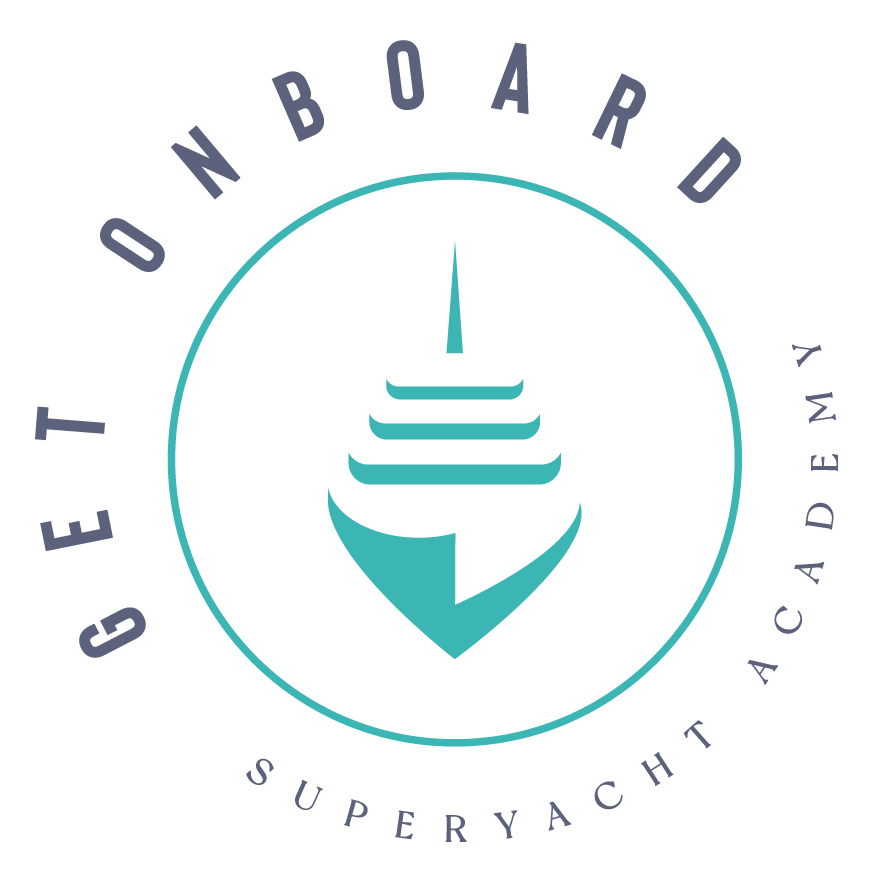
Get Onboard
Superyacht Training


Taking a Gap Year and Working on A Luxury Yacht
So you’re thinking about taking a gap year from studies and going to work on a luxury yacht? We can tell you from experience that you’re in for one hellova ride! But also, possibly one of the most rewarding jobs you’ll ever have.
Most people’s first question to us is usually along the lines of “was all that stress and time away from friends worth it?” – Yes my friend, yes it was! It was incredibly challenging at times with a steep learning curve, but so rewarding . The experience alone taught us so many things that will help you when you decide to go back to your studies, or pursue a career post studies.
Taking A Gap Year
Taking a gap year between high school and college has been growing in popularity and can be a great alternative and opportunity for those who need a change of scenery with an abundance of growth and learning.
If you are considering continuing your studies on your return, it is advisable to possibly still apply to college or university in your senior year – thus taking advantage of high school connections, counsellors and teachers for support, and referrals. It’s also a great idea to ask prospective institutions about their gap year policy – which will also quickly help you determine whether it is for you or not. Some may require that you interview prior, and put down a deposit for your deferred studies.
Convincing Your Parents
The easiest way is to guarantee that you will continue to study further, by applying to your institution of choice prior to announcing your gap year, and of course telling your parents that some of the funds you’ll make on your gap year will go towards your further education!
The other is to convince them that it’s not a holiday – especially in the case of working on a luxury yacht. It may look glamorous and all, but it’s going to be a lot of discipline and hard work. You’ll learn some great people skills, tenacity and patience – all great skills to have for your further education or career later on.
What You Need To Know: Jobs Available
The most common types of jobs on superyachts, especially with no prior experience are for deckhands and stewardesses .
These roles do not require previous yachting experience, making these the easiest positions to jump into for inexperienced crew. Responsibilities for deckhands include deck maintenance, chamois/polishing the boat exterior, launching and driving tenders and assisting guests with the safe use of the boat’s ‘toys’ – banana boats, jet skis, laser sail boats etc. The stewardess’ responsibilities include detailing the boat’s interior, guest and crew laundry, housekeeping, meals and drinks service.
There is a lot of competition for the rookie jobs on yachts. The better prepared you can be, the more chance you might have of landing that job on luxury yacht or superyacht.
What You Need To Know: Eligibility
Typically aged 18 years or older are considered.
No criminal record.
Be able to swim.
Medically fit to pass a ENG1 Medical Examination .
Sufficient funds to pay for program fees, flights and all additional costs.
Be independent, self-motivated and customer service oriented.
Looking to work for a full year or longer.
What You Need To Know: Prep, Training & Visas
Certain credentials are now mandatory for new crew looking for superyacht jobs. Any person working on boats must hold an up-to-date seafarer medical certificate . In addition, all crew members must have completed the nine-day basic safety training course – STCW 2010 .
Anyone looking to get into working on superyachts should be aware of the potential costs involved. The STCW course alone costs approximately R6,500, plus there may well be travel and accommodation expenditure involved, with no guarantee of a job at the end of it all. Having sufficient funds to go and live in some of the popular yacht departure locations, such as the south of France, Mediterranean, Caribbean etc will also help your chances of getting a job – as you can meet the Captain face to face.
You will also need to be prepared to work hard . The industry is well-known for its long hours and round the clock duties. In addition, crew quarters are invariably small and cramped, and undoubtedly you will be sharing with another person. The ability to get on well with other crew members in such conditions is a life skill worth learning.
Depending on where you’ll be located, you may also require specific Visas for travel and/ or work permits. Some Visa approvals can take quite long, depending on your local government, and country of travel. Be sure to try and plan in advance. You don’t want to get the opportunity of a lifetime only to be stuck on-shore as you don’t have the correct Visas!! Speak to us on tips to plan for this.
What You Could Earn
With no prior experience you would typically start as Junior Stewardesses (girls) or Deck Hands (boys). These positions will see you working very hard, often long and unsocial hours, but wages are substantial (and tax free) and the travel opportunities and other perks of the job are fantastic. Progression up through the ranks (and earning potential) will depend on your work ethic and level of motivation.
The earning potential onboard is also significant. Starting salaries for new crew are in the region of $2,200 per month. That’s also tax free and with no expenses as your living costs are paid for onboard. Some crews also will earn tips in addition – but this largely depends on the type of yacht you’re on, who’s on board and the purpose of the sail.
All in all, if you’re considering a gap year, the time it takes for training, courses, visas and just general waiting time to get picked to crew, can take a couple of months. If you are serious about doing this, try as best as possible to plan in advance . Go mix with local yachties and find out when the next opportunity could be. Sign up for placement academies and get your yachting CV ready.
With the right credentials and a bit of luck, you might just land your dream role working on a luxury yacht, making money, rubbing shoulders with the world’s rich and famous and getting to see some beautiful places whilst at it.
Download our ultimate deckhand insiders guide , or book a consulting session with us to help you through your next steps.
Needing more?
Error: Contact form not found.
RYA/MCA Online
1. what are the basic requirements you need to be eligible to work in the yachting industry, 2. what is the stcw and why do i need it, 3. what is the eng1 medical certificate, 4. what land based experience will help me find a super yacht job, 5. what are the different departments onboard, 6. what crew training is required for me to work as a junior deckhand.
- Yachtmaster/Coastal Skipper Theory
- Yachtmaster/Coastal Practical
- Specialist Super Yacht Training Course (Deck Hand Training Course)
- RYA Power Boat Level II
- RYA Personal Watercraft Course
- RYA Competent Crew Certificate
- RYA Day Skipper Theory and Practical Certificates
- VHF Radio Operator’s License
7. What crew training is required for me to work as a junior stewardess?
- Stewardess Course
- Proficiency in Designated Security Duties (PDSD)
- MCA Food Safety Level 2
- RYA Powerboat Level 2
8. How do I book my training courses?
9. how do i get my first job on a yacht, 10. are these courses worth it, or am i just wasting my money, 11. will i get hired for my first job from south africa, 12. what is daywork, 13. what are the best locations to get a yacht job, 14. how much can a motor yacht stewardess or deckhand earn, 15. what are the negatives of working on a yacht, 16. what are the positives of working on a yacht, 17. is working on a super yacht for everyone, 18. what is the minimum age to work on a yacht, 19. is accommodation provided when i am completing my yacht training in cape town.
Work On A Yacht
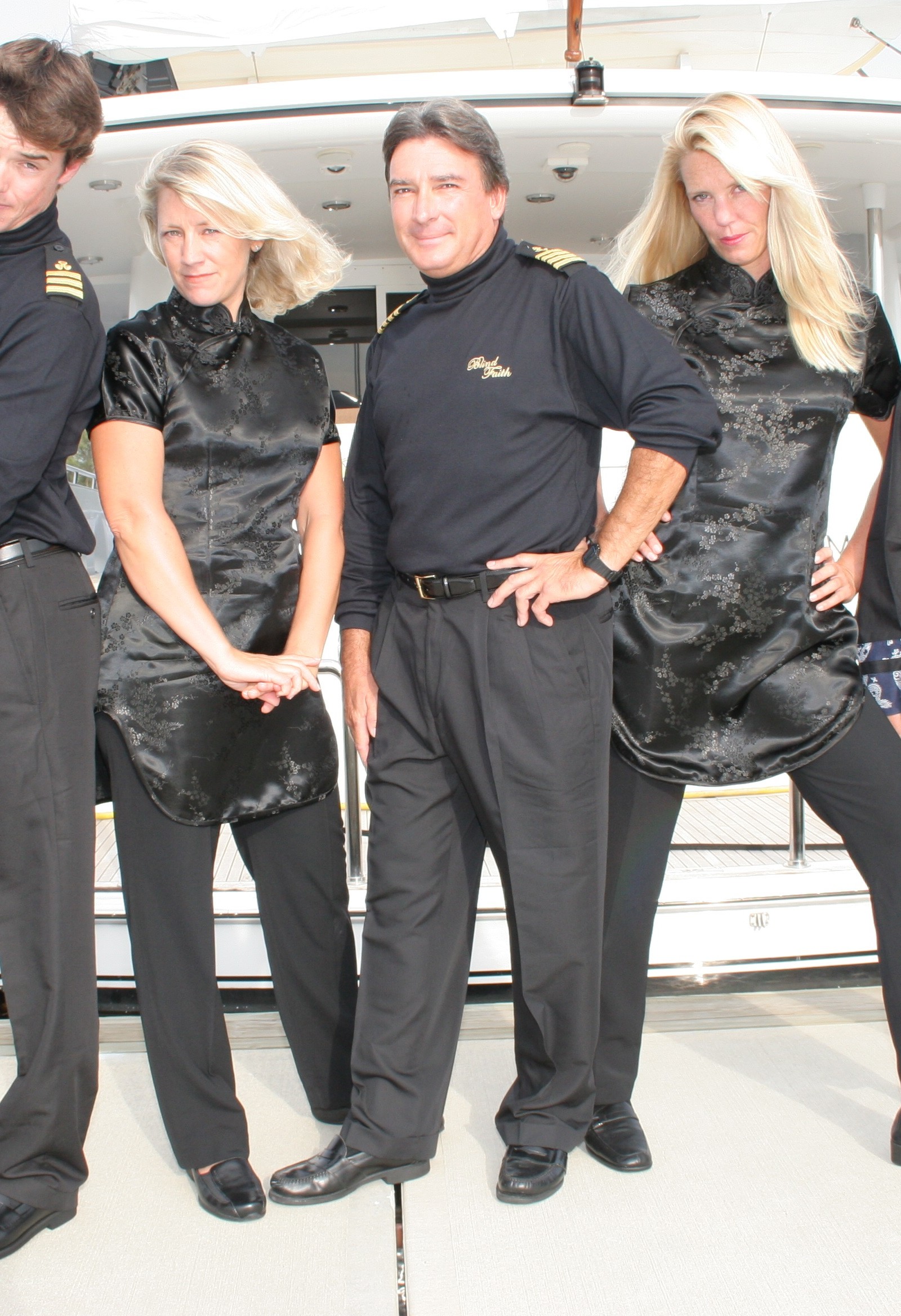
From the Blog Subscribe Now
Careers in the Yachting Industry: What Can a Yacht Stewardess Do in the Future?
May 1, 2022 By Julie Perry
One of the chief questions I hear from people I recruit into the yacht-crew industry is this: “But what will I go do after that?”
For some yacht stews, the job represents a long-term career path where they can work up to chief steward/ess status and stay in the industry for 10 or 20 years. And with such high-paying salaries for top-quality chief stews, who can blame them? Others decide they want to work in a different capacity onboard, and they go on to culinary school to become yacht chefs. Some even get their Captain’s licenses.
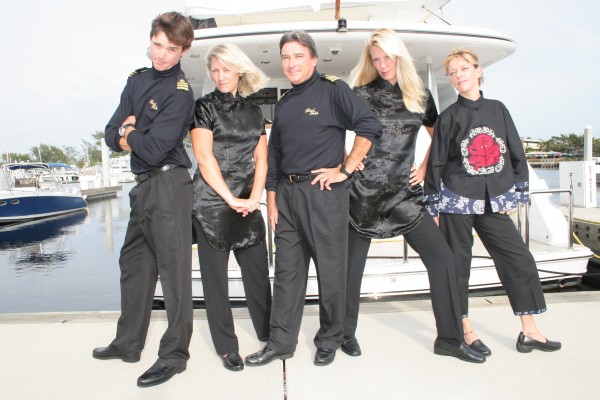
Luxury Yacht Crew Photo Copyright: Suki Finnerty of YachtingToday TV.
Becoming a superyacht purser is another option. Purser positions only exist on the larger boats, and openings are hard to come by (and are oftentimes held by the captains’ wives), but they’re out there, and they pay well.
Then there are those stews who get burnt out after a time—they want to plant some roots ashore, start a family, or transition into another line of work. If you are wondering what type of jobs being a superyacht stew can prepare you for, I honestly think the list is endless.
When you feel the need to go back on land, there are plenty of opportunities in and around the marine industry—if you choose to stay in it. I began with crew placement, then I went on to work for yacht and charter brokers, and then I worked for Yachting Magazine until the training school became available.” —Kristen Cavallini-Soothill, owner and operator of American Yacht Institute
Career Options in the Luxury Yachting Industry
When you decide to leave your life at sea behind, the most likely career path is to stay in the yachting industry by parlaying your onboard expertise into a land-based job. There are many exciting careers to be pursued in the superyacht industry:
- Become a crew-placement specialist —Assist yacht crew in finding jobs (and vice versa: assist the yachts in finding crew). Another name for this occupation is crew agent or crew recruiter, and this person usually works at a crew placement agency .
- Work for a yacht-management company —Yacht managers serve as liaisons between the owners and the captains, helping manage the overall operations of vessels that have chosen to enlist third-party management services (which many now do). There are a number of both small and large yacht-management companies where you could serve in this capacity.
- Work for a yacht-provisioning business or a yacht chandlery — Yacht-provisioning businesses are located in nearly every major port, and their job is to provide the boats with food and beverage items, which, in the case of luxury yachts, means supplying the freshest products, specialty items, and gourmet goodies of all types. Orders are often delivered directly to the yachts. Yacht chandlers are similar, only they supply boats everything from uniforms to mechanical parts to marine accessories and equipment.
- Become a yacht agent — Yacht agents are land-based contacts, situated near the areas where yachts travel, who offer all kinds of support services to the crew. Things such as advising on customs procedures in the nearby ports, obtaining products or provisions that the crew can’t find on their own (or don’t have time to look for), and even receiving and signing for shipments that arrive when the yacht and crew are at sea.
- Become a charter broker or a yacht broker —As the names suggest, yacht brokers serve as agents in negotiating the sale of yachts, while charter brokers handle the chartering of them. For ex-stews carrying all that previous onboard experience, becoming a charter-yacht broker is a wonderful career option.
- Study to become an interior designer for yachts —This doesn’t happen overnight, but it’s a great vocation to aspire to if you have a flair for decorating.
- Work for the yachting media —When it’s tough to leave the yachting world behind, you can consider working for one of the many publications and/or websites that covers the industry. (Somebody’s gotta write all those crew-focused articles on Dockwalk .) Write for them, or even sell advertising space using all the great contacts you’ll have made. Related to this, you can start your own blog.
- Get a job at one of the crew-training schools —Teach others to become professional crew. As the industry grows, enrollment levels at the maritime and specialized crew training facilities will become increasingly important. Teach or aim to become an administrator at one of these schools.
Working onboard yachts is an awesome job. It offers opportunities that most people don’t even realize exist. It doesn’t only have to be a short term or ‘gap year’ job. It can lead to a lifetime career in an amazing industry. Work onboard, work hard, take it seriously, and travel the world. When you are ready to go ‘land-based’ you can still have a home in the yachting industry. I always say that after almost 10 years on yachts, I started my second career in yachting. I love what I do, and because of my years on yachts, I have a unique perspective working with my clients and truly understanding who they are and what they do.” —Julie Liberatore, former Regulatory Liaison Maritime Professional Training (MPT), and former Yacht Stew
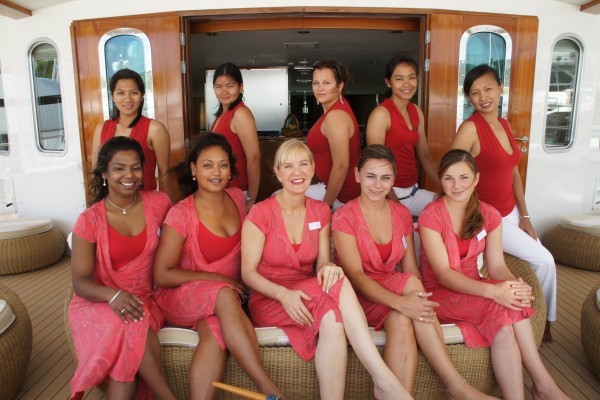
Interior Crew on M/Y Sherakhan Photo Copyright: Suki Finnerty of YachtingToday TV
Beyond Yachting – What Stews Can Do
But don’t think you’ll be bound to boating for life. There are a multitude of careers that make perfect follow-ups to yachting, and which are completely unrelated. I’ve seen so many unique jobs come out of this. You’ll walk away with the demeanor and the quick-thinking ability that makes you adaptable enough to work with any kind of person and in a variety of environments.
If you’ve never been before, you could go on to college, or finish up a degree you once started. If you are already a college grad, you might choose to pursue a graduate degree or professional certification program. Regardless, you can go back to school confident that you will do well because you will have a whole different worldview— and you can pay for it.

Naturally, there’s always the possibility that you’ll make a connection through an owner or guest that will lead to a job outside of yachting. A lot of yacht stews go on to become estate managers, working at the homes of the yacht owners and managing their private affairs…or, they may want to put you to work in one of their companies. You may meet someone who gives you their card and says, “If you ever leave this industry, give me a call”—like Mark Cuban, for example. I know of a former stew who went to work as an event coordinator for one of the major television networks in New York City. An executive staying onboard took note of her superb attention to detail when throwing last-minute dinner parties, and she snatched her up.
You will leave this industry with extreme skills in hospitality, so you could do nearly anything in that field, such as work in hotels or restaurants. Event planning is also an excellent career choice, as is catering. I’ve heard of former stews who’ve set up their own businesses just running errands for people.
Below are some outstanding follow-up careers for which steward/essing can prepare you:
- Estate manager (this is very common)
- Event planner or promoter
- Personal assistant or personal shopper
- Sales representative for a wine and spirits company
- Bar or restaurant manager (or better yet, open a wine bar!)
- Etiquette consultant
- Hotel manager
- Bed and breakfast owner
- Travel consultant or agent
- Professional organizer
- Tour director
- Flight attendant (although you will want to probably stick with private jets at that point)
Note: If you are already in one of the occupations or industries I’ve listed above, you are sitting on skills that are perfect for transferring over to yachting.
Some people even get married to fellow crew. And with that, there’s a possibility you might settle down in another country.
The list is endless!
The more knowledge you have of the industry, the better. That gives you transferable skills into the land side. For example, I became a crew agent. Former stewardesses also go on to become yacht brokers, managers, or provisioners. There are all kinds of outside services that work with the marine industry.” —Lynne Cottone, Crew Placement Specialist with Luxury Yacht Group
While this post gives you some ideas on how to respond to the “Negative Nellies” in your life who try to talk you out of pursuing a crew job on superyachts, I know from experience that it might take more ammunition than just listing jobs you say you’ll be able do…
What you want to tell these pessimists about are the SKILLS that you will gain as a superyacht crewmember. Good news! In my post, “ Superyacht Crew Jobs: Gain Skills for a Bright Future ,” I cover how to spin having crewed on yachts on your post-yachting CV / résumé and on your LinkedIn Profile. I even give you an excerpt of what I used on my own résumé when I transitioned to become a marketing executive in the tech industry. Check it out !
Want to learn more about getting started as crew in the superyacht industry? Start by downloading Chapter 1 of “The Insiders’ Guide” here .

[…] of hopeful yacht crew from around the world, but I’ve seen many of them go on to have terrific careers in yachting. In addition, several of the top yacht-crew training schools tell me that, to this day, they have […]
About Julie Perry
Our latest tweets, get our email newsletter.
- Name * First Last
- Comments This field is for validation purposes and should be left unchanged.

WHY WORKING ON A SUPERYACHT IS THE BEST WAY TO SPEND YOUR GAP YEAR?

We were inspired to write this summary by an article from Flying Fish that highlights the benefits of working on a superyacht during a gap year. Working on a superyacht can be an exciting and unforgettable experience for many reasons. We'll explore some of the advantages of working on a superyacht and why it could be an excellent way to spend your gap year. Here are some of the reasons why:
Travel Opportunities: Working on a superyacht can take you to some of the most exotic and breathtaking destinations in the world. You'll get to travel to different ports, explore new cultures and make unforgettable memories.
High Pay: It can be an extremely lucrative job. You can earn a high salary, plus tips and bonuses, and this can be a great way to save for future endeavors or pay off debts.
Professional Development: You'll gain lots of experience in a variety of roles, whether you work as a deckhand , stewardess , chef , or engineer . You'll also learn valuable skills such as teamwork, communication, problem-solving, and customer service.
Networking Opportunities: Working on a superyacht can provide you with excellent networking opportunities. You'll meet people worldwide, including other yacht crew members, yacht owners, and guests. This can help you build a network of contacts that could be valuable in your future career .
Adventure : Last, but not the least - working on a superyacht can be an exciting and adventurous way to spend your gap year. You'll face new challenges, work in a dynamic environment, and meet new people. It can be a great way to step outside of your comfort zone and grow as a person.
Working on a superyacht during your gap year can offer a unique and rewarding experience that you'll never forget. From the travel opportunities to the professional development and networking prospects, there are many reasons why working on a superyacht could be an excellent choice for your gap year. If you're interested in learning more about the benefits of working on a superyacht, we encourage you to check out the original article .
Also, don’t forget to check out our main deck , where you can connect with other crew members and find job listings for the industry.
Sorry but you are using an outdated browser. Please click here to improve your experience × Close

- Courses RYA Practical Sailing Courses Shorebased Courses Sailing Masterclasses Online Courses Women's Sailing Courses Youth Sailing Own Boat Tuition
- Cruises Channel Islands Cruise Caribbean Cruises Ocean Passages Normandy Cruise West Country Cruise
- Fastrak Fastrak Day Skipper Fastrack to Yachtmaster Offshore Day Skipper Course - Shore based and Practical Fastrak to Coastal Skipper Course Bespoke Sail Training Programmes Fastrak to Yachtmaster Ocean
- Youth Sailing Teenagers - RYA Competent Crew Course Teenagers - RYA Day Skipper Course Day Skipper Theory and Practical Course Duke of Edinburgh's Award - DofE Sailing DofE - Team Sailing Expeditions DofE - Open Gold Sailing Expeditions DofE - Open Silver Sailing Expeditions Gap Year Sailing 2023-24 DofE - Residential Sailing Courses
- Racing Round the Island Race RYA Basic Sea Survival Course RYA World Sailing Offshore Personal Survival Course
- Special Offers
- Contact BOSS Bank Details - British Offshore Sailing School Subscribe Enquiry Form Sailing Experience Form Joining Details Booking Form Send us a message
Take a Sailing Break with BOSS
Gap Year Breaks
Plain Sailing
British Offshore Sailing School
Gap Year Sailing 2023-24
BOSS Specialises in offering a range of sabbatical, career change and Gap Year sailing programmes ranging from 2-week skipper training breaks through to 18-week intensive FastTrack to Yachtmaster training courses. These courses are available to both novice and experienced sailors and all lead towards internationally recognised Royal Yachting Association (RYA) and Maritime and Coastguard Agency (MCA) qualifications.
18 Week programmes start in February, May and August, with shorter courses and tailor made training packages on offer regularly throughout the year. Whether you are looking for a traditional gap year, career break experience, or you want to retrain and gain useful yachting qualifications this programme is the ideal way to realise your ambitions. Once you hold the commercially endorsed Yachtmaster Certificate of Competency you could start travelling and working straightaway. It’s also a great way to supplement your income during your spare time. Weekend and holiday work is readily available in the UK, Mediterranean and Caribbean.
Participants under 24 years of age can also complete the Gold Duke of Edinburgh’s (DofE) expedition and residential sections (subject to DofE requirements). Expedition programmes run over 12 days and the residential sections take a further five. These can be completed individually of as part of a longer programme.
Our Gap Year programmes are fully inclusive of accommodation on board a yacht, food on board whilst on practical sea phases, wet weather gear, safety equipment and course materials. Shorter, week long practical sailing courses are also available for those who just want to try sailing or gain some basic yachting experience.
Whether you are looking to gain some useful qualifications whilst having a great time, or you simply want to spend time developing your sailing skills for personal fulfilment – give us a call on +44 (0) 2380457733 or email [email protected]
Quick Links
Fastrack to yachtmaster offshore.

18 Weeks FASTRAK to Yachtmaster is the original comprehensive, eighteen-week, professional seamanship training programme designed and run by the British Offshore Sailing School.
Can't find the course you're looking for?
Fill out our sailing experience form and we'll find the right course for you.
Cookies help us deliver you the best experience possible. By using our website, you agree to our use of cookies. Learn more Close

Gap Year World
Sailing Courses

Fancy a career on the ocean? Get a recognised sailing qualification and learn the skills to get a paid job or career sailing in exotic locations around the world.
Featured Courses

RYA Day Skipper Certificate in Croatia
• 1 week £2,995

RYA Competent Crew Certificate in Croatia
• 1 week • Price from £1,945

RYA Day Skipper & RYA Competent Crew Certificates in Croatia
• 2 weeks • £5,245
Get Your Sailing Certification
If you are a total beginner there are entry level courses focused on the principles of sailing a yacht. More advanced courses and qualifications are available helping you to get the skills to become crew or a skipper.
What are popular locations to qualify? Croatia, Greece, the UK, USA and Australia.
How long does a sailing course take? Course vary depending on the provider but usually to learn the basics of sailing it can take between a few days to weeks. If you want to get a recognised sailing certification this usually takes 1-4 weeks+.
Cost Sailing qualifications, especially the more advanced levels aren’t cheap. Some companies offer day options starting from around £399, but most cost a lot more.
Job Prospects Once qualified you will be able to apply for jobs around the world. Lots of companies offer gap year jobs on yachts in exotic locations around the globe like the Mediterranean, Asia and the beautiful Caribbean. There are short term positions and seasonal jobs , whilst some people turn this into a lifelong career.
Similar Opportunities

Scuba Diving

Ski and Snowboard

Share this:
- Click to share on Facebook (Opens in new window)
- Click to share on Twitter (Opens in new window)
- Click to share on Pinterest (Opens in new window)
- Click to share on Tumblr (Opens in new window)
- Click to share on Reddit (Opens in new window)
- Click to share on LinkedIn (Opens in new window)
- Click to share on Pocket (Opens in new window)
- Click to share on WhatsApp (Opens in new window)

Spend Your Gap Year Gaining Experience Working On Superyachts

Working on boats as a stewardess or deckhand is one of the most exciting and rewarding ways to spend a gap year after graduating from school. Taking a gap year after finishing school has numerous advantages, and one of the most exciting and rewarding ways to spend it is to work on yachts.
There are numerous reasons why young people should carefully consider taking advantage of this one-of-a-kind chance, despite the fact that many individuals may be afraid to start on such a journey.
Working aboard a yacht, first and foremost, affords one the chance to see the globe and learn about different cultures. You will have the opportunity to travel to some of the world’s most spectacular and unusual locations if you choose a career as a stewardess or deckhand on a cruise ship . These locations range from the glistening waters of the Caribbean to the breathtaking coasts of the Mediterranean.
Opportunity
You will get the opportunity to become fully immersed in a variety of cultures, indulge in new culinary experiences, and educate yourself on the history, rituals, and practices of the locations you visit. This kind of learning is far more useful than anything you might read about in a textbook, and it has the potential to extend your horizons as well as your grasp of the world.
In addition to the opportunity to see the world, working aboard a yacht may also give you invaluable job experience that may be of use to you in your future professional life. You will be responsible for delivering great service to guests, managing stocks and supplies, as well as keeping the boat clean and well-organized in your role as a stewardess . This needs a high degree of attention to detail, excellent communication skills, and the ability to operate effectively while under pressure.
Responsibility
You will be responsible for aiding with the operation and maintenance of the yacht in your capacity as a deckhand. This will include responsibilities such as cleaning and polishing, navigating, and managing lines and fenders. These are transferable abilities that may be utilized in a wide number of different areas, such as the marine industry, customer service, and hospitality.
Working aboard a yacht provides you with the ability to expand your professional network, which is another of its many advantages. During your time on board, you will collaborate with a varied group of people from all over the world, including the ship’s captain, the head chef, the lead engineer, and other crew members. You will have the chance to build great relationships with these folks, and in the future, they could be able to supply you with crucial recommendations and connections.
Networking Opportunity
Working aboard a yacht can also put you in contact with well-known people, such as celebrities or corporate leaders, who may be passengers on the vessel. This can be a beneficial networking opportunity. This is a one-of-a-kind chance to cultivate professional relationships and broaden one’s exposure to a variety of fields and occupations.
In addition to the advantages it offers on a professional level, working on a boat may also be a very personally satisfying experience. Living and working aboard a boat calls for a high level of adaptation and independence, and doing so may be an excellent way to develop one’s self-reliance and confidence.
In addition to this, it gives you the chance to cultivate a strong feeling of camaraderie and collaboration with the other members of the crew, as you all work together to deliver an amazing experience for the passengers that are on board. On a yacht, the sense of camaraderie and shared purpose that may emerge can be tremendously satisfying and enjoyable for those who participate in it.
When thinking about spending a gap year working aboard a boat, it is important to be aware of the many difficulties and factors to take into account. The work can be physically taxing, and there is a possibility that you will be needed to put in long hours and spend significant portions of your time away from home.
You will need to have a passport that is still active as well as the ability to secure any visas or work permits that may be required for the countries that you will be traveling to. In addition, the cost of maintaining a lifestyle aboard a boat may be quite costly; therefore, you may need to create a detailed budget to ensure that you can meet all of your financial obligations while also putting some money aside for potential future opportunities.
Despite these obstacles, the advantages of working aboard a boat can sometimes exceed the disadvantages by a significant margin. The experience has the potential to be transformative, resulting in the acquisition of useful skills, increased personal development, and a fresh point of view on the wider world.
Working aboard a boat could be the ideal option for you if you are thinking about taking a gap year after high school, you are seeking an experience that includes travel, professional development, and personal growth, and you are looking for an adventure that mixes the three.
Submit a Comment Cancel reply
Your email address will not be published. Required fields are marked *
Quick Links

- Sailing Trips
Gap Year / Sabbatical Sailing
Adding item to wishlist requires an account, already a member, don't have an account create one., why book with us.
- A not for profit organisation
- Personal customer care
- Honest advice
- Highest safety standards
Got a Question?
Do not hesitate to give us a call. We are an expert team and we are happy to talk to you.
+44 7941414 703
Sail Racing Academy offers individualised Gap Year programs to suit every taste. From a month to a whole year; cruising and regattas; in Great Britain, the Mediterranean or the Caribbean; we offer everything. Our experienced skippers are happy to help you gain experience and knowledge for sailing licenses. We strive for the best balance between practical experience, theoretical knowledge and enjoyment.
You will be an active member of our team. During regattas, outside of sailing, there is a packed calendar of social events. During this time there will be plenty of opportunity to have fun and further develop the sailing network.
Between regattas there is always a lot to do to maintain, repair and keep the yacht clean. This is a good time to learn the mechanics behind sailing with enough time to get to know the surroundings while the yacht is at anchor. Our Gap Year participants will help with around 20% of the maintenance on board.
- Regatta You will be crewing in top level international regattas
- Professional skipper You will work alongside our excellent trained skippers who will share their valuable knowledge with you.
- Location You will be sailing around Britain, the Mediterranean or the Caribbean
Apprenticeship Includes
- Accommodation on board (shared cabins)
- Meals at sea (self service)
- Certified Professional Skipper
- Basic Training
- Consumables for the yacht (diesel, fuel and water)
- Mooring Fees
- Insurance for the yacht
- Personal locator beacon
- Transfers: Airport - Marina - Airport
Price Excludes
- Meals offboard
- Shore based accommodation
- Personal insurance (we recommend Topsail)
Complementaries
- T-Shirt with your national flag

What to expect
Each day will be different.
Your time with us will be varied. You will be required to actively participate in all elements of yacht maintenance, as well as sailing and racing. Also loading, cleaning and getting the yacht ready for regattas.
You need to be self-motivated, able to work alone and with a team.
There will be times where the pace will be relaxed and you can work at your own speed and as part of a team. And at other times you will be working alone and to tight deadlines, where initiative, self-motivation and communication are key.
Achievements
By the end of your time with us, you should have achieved your goals. We hope that you will leave us as a confident sailor who is able to prepare and sail independently; lead teams; identify problems and know how to resolve them.
Official qualifications
Should you wish for your program to include work towards official qualifications, that is something we are happy to discuss.
You will be actively involved in the mile builders and regattas from welcoming additional clients onboard, helping provision, and of course partaking in the races. Outside of these times, there are plenty of opportunities to enjoy the local area, relax and recuperate.
*SUBJECT TO CHANGE*
Some of the 2025 Caribbean Regatta dates have not been confirmed yet. The dates below are based on previous years and the CSA Caribbean Sailing Calendar. Please check this page frequently for updates.
29th Dec 2024 - 1st Jan 2025 Explore St Lucia
If you’ve just arrived in St Lucia here’s your opportunity to explore the island before we depart.
2nd - 14th Jan 2025 Explore the Grenadines
Join us as we explore the Grenadines, visiting Union Island & Bequia as well as Tobago Quays and many other stops in between.
15th - 22nd Jan 2025 Round Barbados Sailing Week
Spend some time exploring Barbados and then join us for Round Barbados Sailing Week; the first race of the season and a great opportunity to network and get to grips with round-the-cans racing.
23rd - 24th Jan 2025 Rum to Spice Race
This event was introduced in 2024 as a feeder race between Barbados and Grenada Sailing Weeks. From Barbados to Carriacou, Grenada, it should take under 24 hours to finish. We highly suggest anyone participating in Grenada Sailing Week to join this race and get some extra practice in.
25th Jan - 31st Jan 2025 Grenada Sailing Week
Grenada Sailing Week is a smaller regatta but one of our most experienced skippers describes it as their favourite. It involves some fun & fast round-the-cans and coastal racing. Starting from one of the most beautiful small islands in the Caribbean, Carriacou and finishes in Grenada, known as the Spice Isle!
1st - 17th Feb 2025 Island Hop Grenada to Antigua
A hugely popular part of our Caribbean season and a great chance to relax and visit some of the islands only accessible by boat and often forgotten. A wealth of hidden treasures.
18th - 28th Feb 2025 Caribbean 600 (additional cost) / Explore Antigua / Undertake RYA Qualifications
There are a huge variety of options to suit every taste and budget this week. Join us for the Caribbean 600 for 4-5 days of amazing offshore racing, explore the island of Antigua, or attend our partner’s training sessions to secure RYA training. You won’t get bored during this week. Please note that the race is an optional extra and not included by default.
1st - 3rd Mar 2025 Sail Antigua to St Maarten
An opportunity to practice the sailing skills you’ve developed so far and take on more responsibility whilst our professional skipper acts as a safety net in case you require some additional support.
4th - 9th Mar 2025 St Maarten Heineken Regatta (additional cost)
This is another inshore round-the-cans & coastal race sailing event. Hugely popular in the regatta calendar. It’s as lively off the water as it is on the water racing, with it’s dedicated race village & live music. Please note that this is an optional extra and not included by default.
10th - 22nd Mar 2025 Cruise St Martin / St Barth
Ok, that’s far too much excitement, now is the perfect time to relax a little. This is a good week to explore St Martin, cruise around the island and recuperate in preparation for the next few regattas.
23rd Mar - 6th Apr 2025 St Thomas International Regatta & BVI Spring Regatta
Back-to-back events that consistently deliver excellent racing set over the backdrop of the US and the British Virgin Islands.
7th - 9th Apr 2025 Explore the BVI's
Hike, swim, practice your sailing skills and explore. Anchor in a different bay every day, snorkel and perfect your culinary skills.
11th - 20th Apr 2025 Les Voiles De St Barth
After the postponement of the 2024 Les Voiles de St Barths, we are thrilled for it to be returning in 2025. There is a choice of 26 possible courses ranging from 17 to 60 miles, with the decision of which course to race being dependent on the weather. The plan is two races a day, without starting too early or finishing too late, reflecting the laid back atmosphere of the island.
20th - 22nd Apr 2025 Cruise Back to Antigua
Hop on board for a trip back to Antigua for an easy connection home or join us for the last race of the Caribbean season.
23rd Apr - 3rd May 2025 Antigua Sailing Week (additional cost)
Antigua Sailing Week has become one of the biggest events in the international sailing calendar, and the final event we participate in before heading back across the Atlantic. Please note that this is an optional extra and not included by default.

Related Tours

Cowes – Dinard – St Malo Race 2024

RORC Caribbean 600 2025
Guillemette
Amazing experience ! I joined l’Escapado crew in Antigua for a few weeks. As a novice I had so much things to learn and couldn’t have learn it from a better crew. I joined several boats since and on my way to get my STCW training. It all started with the Sail Racing Academy and I’m so grateful to them !!
Wow what an incredible experience, opening up so many opportunities, meeting so many people and most importantly learning so much! I joined in Hamble, Uk and am still here in Antigua. The trip from the UK to The Canaries was certainly an adventure with every single bit of weather thrown at us. I found this the hardest but without a doubt my favourite time on Escapado. I learnt so much from different skippers and about life in a watch system. I’d say make sure you have wet weather gear that keeps you dry from rain and huge waves spraying over the boat, secondly it was a lot colder than I expected so bring lots of layers and finally a good attitude! The Atlantic crossing was incredible, again learning so much about flying spinnakers, provisioning, and racing. I was blogging each day, something I have never done before, but a new skill I have continued to do throughout my time on board. I’d say be prepared to be doing a lot of work the week before leaving, this is a good opportunity to get to know the boat inside and out while also bonding with your new crew and eyeing up your competition! All in all Sail Racing Acadamy has been a life changing opportunity for me. I have met friends for life, learnt so much and opened up so many opportunities for work, contacts and sailing in the future. I was nervous that I wasn’t a competent enough before joining however I was more than wrong. There’s always lots to learn. Be ready to help maintain the boat, fix a few problems and adapt to life on a race cruiser. Fair winds and happy sails. Iona 🙂
Eddie Morrison
Brilliant organisation. Offers fantastic trips and in my case an amazing gap year opportunity. Will definitely recommend to others 👍
This website uses cookies to enhance your experience, is that ok?
Proceed booking.

Yacht Crew Wanted
Amateur and professional yacht crewing positions available worldwide, from daysailing to transocean for all experience levels.
Search sailing opportunities
For yacht crew
It’s free for everyone to browse though all of our current sailing opportunities. Become a member to contact yacht owners and join their crew.
For yacht owners
Registration and posting is free if you are looking for a skipper or crew. Find amateur and professional crew for short or long term voyages.
Featured sailing opportunities
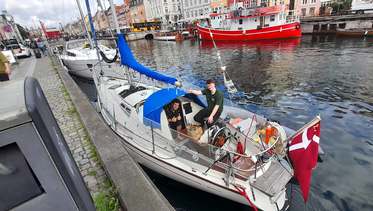
Sailing up to one week around Denmark/ Sweden
Boat type: B31
Location: Copenhagen

Round Ireland Yacht Race 700Nm
Boat type: 1980 Westerly Fulmar 32' fin keel, MMSI number 250004029
Location: Wicklow Ireland

PS40 MX to Papua New Guinea by May '24
Boat type: Cutter Rig Bluewater Passage Maker
Location: Puerto Vallarta, Mexico
Coastal yacht cruising
Professional sailing jobs, ocean sailing voyages, yacht delivery crew, worldwide opportunities, varied vessel types, all experience levels, mile building voyages, short notice sailing, environmental & wildlife vessels, we are recommended by.

Crewseekers notices

What makes an RYA Yachtmaster?
James Stevens, former Chief Examiner of the RYA tell us.

The Atlantic Ocean - from the Caribbean to Antarctica and the Arctic
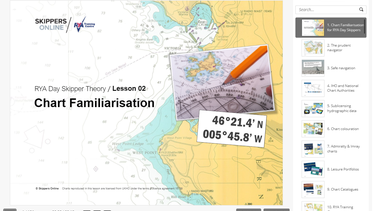
Day Skipper & Yachtmaster theory courses - 20% off
Online RYA theory courses with a great discount courtesy of Crewseekers.
we love sailing as much as you do
Crewseekers is run by experienced, professional sailors offering a friendly and helpful service to yacht crew and owners. We are the original yacht crew introduction agency – established for over 25 years, offering amateur and professional sailing opportunities throughout the world.
Superyacht Crew - Deckhand, Steward, Stewardess, Yacht Chef, Engineers
with Galileo Maritime Academy
Galileo is recognised internationally for supplying first class superyacht crew.
We recruit, train, certify and place you on the finest superyachts around the world.
Our speciality is entry level crew who wish to join this highly paid career working as crew on the yachts of the rich and famous.
We are accredited by the UK government Maritime and Coastguard Agency (MCA). This is the highest standard of international certification for seafarers.

a typical day on this gap project
Get paid to travel the world by sea visiting exotic destinations whilst gaining fantastic life, career and social experiences as a deckhand, steward, stewardess, engineer or chef on a luxury superyacht.
You will work along-side the rich and famous, providing a standard of excellence in service and maintenance which will open up opportunities for unique, social and professional development.

what makes you the ideal candidate
No prior experience at sea is required but qualifications, experience and degrees related to hospitality, travel and tourism, sport, engineering, carpentry, logistics support, security, nursing, childcare, beauty therapy, culinary arts are valued. You will need a current and complete STCW basic safety certification and a superyacht crew Certificate of proficiency. We can provide this on one of our all inclusive career entry courses, living in our luxury crew residence at the Galileo Maritime Academy in Yacht Haven Marina, Phuket, Thailand, the main base for superyachts in Asia.

why choose us for your gap year
Galileo is recognised internationally for supplying first class crew to a growing international fleet of superyachts. We are accredited by the UK government Maritime and Coastguard Agency (MCA), the highest standard of international certification for seafarers. The benefits of this adventurous career are:- Travelling the world on luxury superyachts High tax free salaries and tips Meet new people, visit exotic destinations and experience many cultures Learning new skills and further developing your professional life and social opportunity Being part of an outstanding professional team Involvement in all aspects of water sports and marine exploration
Sorry, this Gap Year is not currently available.
If you would like to hear about gap years similar to this one, please complete the short form below.
Would you like to receive gap year offers and ideas by email? We will only send you relevant information and you can opt out at any time
Please indicate you have read & agree to our use of your personal data

Travel the globe with the coolest job on earth

Skiers wanted Become an instructor - training and job included


Username or Email

This opportunity was posted on March 1, 2021
[ closed ] GAP year/ Sabbatical sailing United Kingdom to United Kingdom ref 12723

Sail Racing Academy wants 9 crew for Escapado, Beneteau First 40.7, 11.97m.
From Southampton, United Kingdom to Antigua, United Kingdom.
September 2022 to December 2023.
Sail Racing Academy offers tailor-made GAP year programs to meet all appetites. From 1 month to 1 year; cruising to racing; the UK, Med or Caribbean; we have it all. Our experienced skippers are happy to work alongside you to help you gain experience and qualifications. We aim to find the perfect balance between practical hands-on experience, theory and fun. You will be an active part of our team. During regattas, when not sailing, there is always a fully packed schedule of social events. This is a great time to have fun, as well as getting to know other sailors and developing your network. Between regattas, there is always plenty to do with maintenance, repairs and cleaning. It’s a good time to learn about the mechanics of sailing. But you will also be able to see and enjoy the beauty of each location where the yacht anchors. Regatta You will be crewing in top level international regattas Professional skipper Our excellent trained skippers will share their valuable knowledge with you. Location Depending on your program, you can be sailing around Britain, the Mediterranean or the Caribbean
Sail Racing Academy is currently based in United Kingdom
What roles/experience are needed (Crew 1): does not matter
What roles/experience are needed (Crew 2): does not matter
What roles/experience are needed (Crew 3): does not matter
What roles/experience are needed (Crew 4): does not matter
What roles/experience are needed (Crew 5): does not matter
What roles/experience are needed (Crew 6): does not matter
What roles/experience are needed (Crew 7): does not matter
What roles/experience are needed (Crew 8): does not matter
What roles/experience are needed (Crew 9): does not matter
Sailing with a Rally: None
I'm looking for (gender): either
Cabins/Sleeping : shared cabin-own bunk
Smoking on board: smoking allowed
Total people on board: 10
Crew roles: Being a tailor made trip, we cater to all levels of experience and can focus on racing, gaining qualifications / experience, cruising, exploring the world, or a combination of all of the above. Just get in toucans we can discus options
Money: voyage cost $60
Travel to and from boat: crew pays
Other Info:
brought to you by

- Subprocessors

This website and its content is copyright of World Cruising Club Ltd
© world cruising club ltd 2021. all rights reserved.
- Employer Login
- Create a free account
- Trips & Tours
Yacht Crew Jobs
From crewing Super Yachts through to Yacht delivery and Yachting instructor jobs you will find it covered in this section.
There are many seasonal jobs on yachts that can open the door to a whole new career for the right candidates. The industry pays relatively well (with excellent tax breaks) and offers the chance of global travel.
All crew including engineering roles need to have the STCW95 qualification , it’s a bit like doing a food hygiene certificate before you work in a kitchen or offshore survival for the commercial sector. It is not cheap at around £1000 but unless you have this ticket you stand little chance of securing a yacht crew job. The initial outlay is more than compensated for by the lifestyle and wages that yacht crew enjoy. If for example you are a chef , you could go and get a great job in a ski resort but you will earn less and the job will more than likely finish come the end of the season. With the equivalent yacht crew job you will earn more for a longer period of time.
Latest yacht crew jobs
IMPORTANT INFORMATION – Please read before proceeding with your application. Please avoid submitting multiple applications - Only apply for the job yo
- Up to £730PCM + Shared accommodation, flights, meals + great overall package

Neilson Active Holidays
Incredible active job opportunities
Shore-based Engineer/Mechanic
- Up to £1760 PCM gross + Shared accommodation + flights, meals + great overall package
Flotilla Engineer / Mechanic
- Up to £1460 PCM gross + Shared accommodation + flights, meals + great overall package
Yacht Crew Recruiters

From the hospitality video channel

Career training with UKSA
Launch your yachting and watersports careers with our industry renowned training programmes

Superyacht Deckhand Training
Training to work as a Deckhand

Superyacht Stewardess & Steward Training
Train to work as a Stewardess or Steward in the maritime industry

Superyacht Cadetship
4 year programme - credible alternative to University
Yacht crew help guide
A closer look at each job role
- Watersports courses
Impartial training and careers advice
Call us: +441983 280 641
+441983 280 641
- Get A Job On A Yacht With No Experience
Are you looking for yacht jobs but have no experience? No problem!
We’re not saying it will be as easy for you as it would be for a more experienced person, but there are still loads of opportunities if you know where – and how – to look for them.
Entry-level roles on a yacht are typically the best place to start
It goes without saying that you won’t get a job as a yacht captain if you’ve never worked on a yacht! You’ll need to set your sights a little lower at first, even if a captaincy is your eventual goal.
But don’t despair; you can still get yacht jobs with no experience – if you know how to go about it! The best place to start for most people is with an entry-level position. This most often means going for a job as a Deckhand or Stewardess.
We’d love to tell you that opportunities are blind to gender – they are supposed to be, after all – but in reality, females are far more likely to be hired as Stewardesses, and males as Deckhands.
This isn’t universal though, so once you have a job on board and have proven your value and reliability, it is easier to shift to a different position that is more in line with the career path you want.
If more senior crew members see your skills and aptitude for a different position, you’re way more likely to get it than if you demand a certain position right from the start.
Read on to discover our top tips for securing yacht jobs with no experience…
13 top tips on how to get yacht jobs with no experience:
1. gain an edge through qualifications.
Qualifications show more than just the skills they certify.
By stacking up a bunch of qualifications on your CV, you show commitment to the industry and a willingness to learn all you can, that is very impressive to a potential employer. Among the qualifications, you should start with are the STCW & ENG1 Medical.
STCW stands for ‘Standards of Training, Certification and Watchkeeping’ and STCW Basic Safety Training is a requirement for anyone who wants to work on a commercial ship – and that includes superyachts. You are required to refresh your fire fighting and Sea Survival qualifications every five years, if you are employed then the Superyacht will pay for any refresher courses.
ENG1 Medical is another mandatory certificate you’ll need to have before you can work on a commercial vessel. The ENG1 medical certifies that you are medically fit and free from any conditions that could prevent you from performing the regular duties that may be required of you.
It also reduces the chances that a medical emergency will happen when out at sea, far from hospitals and doctors. The ENG1 can usually be arranged through an MCA approved doctor, it can’t be completed by your GP. The medical can be arranged within two weeks or less, lasts for two years, and costs around £115.
2. Get all the qualifications in one place
Take our Deckhand or Steward/ess Courses ; both provide all the qualifications (minus the ENG1 medical). These types of courses are an invaluable part of how to get into yachting, and even more important to getting yacht jobs with no experience.
Having taken one or more of these not only shows that you are committed, but it assures the potential employer that you have a pretty good idea of what to expect, even if you’ve never worked aboard a yacht before.
Fewer unpleasant surprises for you means fewer unpleasant surprises for your employer – and that’s great!
3. Have the right attitude
Most employers are willing to train their crew members . In fact, many employers prefer this, as they can ensure that the people they are taking on board don’t have bad habits that have to be overcome.
What they demand, however, is the right kind of attitude. These vary, but you’ll recognise them.
4. Embrace the willingness to learn
Go into every situation with an eye for something you can learn.
If you take on a new piece of information even once each day, this will cumulate into a wide and deep knowledge of your duties, the industry, the yacht you’re on, and the people you’re there to look after.
By being willing to learn, you let a potential employer know that they can get your positive experience and attributes, and add knowledge and experience to them over time. If they get the impression that you think you know it all already, they won’t take the risk on you.
5. Follow directions
Train yourself to listen carefully, listen actively, and to remember the detail. Picture actions in your head as you are being given directions.
Imagine yourself doing the actions you’re being told to do. Once you are on your own to fulfill them, you’re more likely to remember and to do the job properly.
A potential employer won’t mind so much that you’re going for a job on a yacht with no experience if he or she is confident that you will put the experience you do get to good use.
6. Know your place
It sounds a bit outdated, but there is a strong hierarchy on most sea vessels , and yachts are seldom an exception.
You will be an employee there. You don’t have to put up with abuse, but you are not going to be treated the same as the owner, the client, guests – or even more senior crew members.
By accepting that your job is to make the clients feel special and valued, and to ensure the other crewmembers that you are there to be part of a team, you show that you understand the dynamic, and won’t make any serious gaffs.
Taking pride in the service provided is perhaps rare nowadays, but with the right attitude, it is very satisfying.
Show yourself to be a high-quality provider of confident service and respect, and you’ll be perceived as a valuable asset aboard the yacht.
Perhaps even more important than respect and reasonable humility is safety.
Having fun and being silly has its place, but that place is not at your interview, nor during your trial period, nor anytime that you are not 100% certain that it is within the bounds of expected behaviour.
Likewise, by displaying your knowledge of safe behaviour, you give your potential employer less to worry about. On the contrary, you’ll give off the air of being a dependable crewmember – and that’s worth a lot to a crew!
8. Be courteous
There are a lot of things that are not against the rules, but are also not the right thing to do.
There isn’t a list of them, and you won’t find a book on them, but you probably have a good idea of most of them anyway. As a rule of thumb, act toward the owner, the vessel and the crew the way you would want to be treated in each position:
- How would you want your crew to dress and to act?
- If you were the captain, what kind of response would you want to a request or an order?
- If you were the owner, how would you want the crew to address you?
When you know expectations more specifically – like the owner wants to be referred to by a formal title such as ‘your excellency’ or something similar – then you act accordingly.
Until then, do your best. Take any mistakes as learning opportunities. When in doubt, lean toward the more formal, the more courteous, and the more conservative.
This is advisable for informal meetings, job interviews , trial periods and the job in general.
9. Be professional
This term is popular, but difficult to define.
The best way to think about it is as a combination of those things we mentioned above. Be quick to learn, attentive to instructions, aware of and compliant with safety regulations and practices, and always be courteous and respectful of those you work for and with.
A more difficult part of this is to take pride in what you do, and to respect your own position, however humble it may seem in the company of captains and owners and guests. You can expect to be treated with normal human respect, not to be abused, and to be given room to learn how to do your job better.
In most cases, professional behaviour will be met with a respectful response.
10. Have the right CV
If you’re still referring to your CV as if it is one, static thing, then this is one of those learning opportunities. In reality, your CV should be almost as varied as the positions you’re applying for.
It all has to be true of course, or you’re setting yourself up for grief and failure – but a properly crafted CV will put your name at the top of the ‘possible hires’ list… and that’s what will get you your interview or trial period.
Tailor your CV to suit the position on offer. Be truthful, but highlight the things that fit what they’re looking for. Is the yacht in a very hot climate?
Show experience working or living in very high temperatures. Are you likely to be offshore for weeks at a time? Express your desire for adventure and challenge.
Always include other languages spoken, international travel, hospitality or mechanical skills, and of course any experience you’ve had on boats or ships in the past.
Look for keywords in the job description and – tactfully – add them to your CV. For example, if the advert states that it’s looking for ‘responsible’ crew, then highlight positions of responsibility you’ve had in the past.
It can be anything from childcare to responsibility closing a shop in the evenings or opening it in the mornings.
Most of all, make sure each of the advert’s ‘must-haves’ are covered. If you are missing any of them, highlight the lack but explain why another attribute makes up for it and that you are quick to learn.
If there is also an ‘also beneficial’ section, cover those too. If you skilfully tailor your CV to each job, you will show yourself to be the one they’ve been looking for all along.
11. Go to the right marina
If you picture yourself in crisp whites, striding the polished deck of a superyacht, don’t look for work at a narrow boat marina. Go where the yachts are.
You probably won’t get a position on a superyacht for your first gig, but you’ll want something similar.
Look for ocean-going experience in the luxury sector. You may need to start on the small end of the spectrum, but make sure you’re on the right spectrum!
If you can, get out to the fancy marinas and make yourself known (in a good way). In other words: network.
12. Network and get your name out there
Any time you can become known to people in the industry – from deckhands and stewardesses to captains and billionaires – you should take the opportunity to do so.
Shake hands, smile, show yourself to be clean, tidy and in possession of the right air and attitude.
Join Facebook groups of people who work in the industry. Make sure your Social Media presence is positive and that you don’t get caught up in criticising or complaining about those you want to hire (and pay) you.
Your social media should reflect all the things a prospective employer might like. In this day and age, it is very likely they will look at your profile before offering you a job.
Look for related job fairs as well; contact yacht crew agencies such as YPI Crew and Insignia Crew, or through your training centre like Flying Fish who have contacts in the industry. We take students to Antibes to find work .
13. Be flexible and willing to start anytime
The key to getting a job on yacht with no experience is to be focused on the experience – not the pay or even the type of job.
If you have a chance to get someday work, you gain items to add to your custom CV. Add a few of these and suddenly you aren’t the one with no experience anymore. A few good showings as a temporary crew can mean you’re the first one an employer calls when there is a vacancy to fill.
This willingness shows a serious drive to be a part of the industry – not simply a drive to earn some cash doing any old job. That’s the kind of person prospective employers are looking for.
Ready to find your first Superyacht job?
All the above tips should give you a solid starting point from which to search for yacht jobs with no experience! You should also download our guide to finding and thriving in your first Superyacht job below.
The next step is to complete your Superyacht training! Simply get in touch to book your place on our Superyacht Deckhand course or Superyacht Stewardess course today.
Related articles
- Seafarers Tax
Do I need to pay off my Student loan if I work on a Superyacht?
Good question! First, let me say that the information below is aimed at people who have studied in the UK and took out a Student Loan to cover course ...
Have I got the right experience to work in yachting?
If you’re thinking about working on board a Superyacht, we share the skills and experience you need and how to get into the yachting industry in thi...
Download – Ultimate Guide to Working on Superyachts
So you’re thinking about getting a job on a Superyacht? Having a career on a Superyacht is a dream job: it will change your life forever. You g...

Bridging Age Gaps
Yachts are filled with crew who come from all different walks of life. Some are young twenty-somethings who joined the industry during their gap years and loved the lifestyle enough to turn it into a career, while others are industry veterans who have enjoyed years in yachting. A number of yachties became so because they felt unfulfilled in their office jobs and opted for something more exciting. This cocktail of crew often means Captains are leading a yacht filled with personnel of varying ages. Getting the crew to get along will be the success of the vessel, so how do Captains and HOD’s bridge the age gaps of the crew?
They say, “Age is nothing but a number and a state of mind,” but it’s a pretty hard pill to swallow when you, as a seasoned seaman, have to take orders from a superior who is the same age as your child. Harder still is being the young superior; in charge of an entire department of crew, some of whom have been working longer than they’ve been alive.
Walking the ‘age over expertise’ tightrope is tricky. The last thing you’d want to do is offend someone but business is business.
A younger HOD may have been hired because their training and skill set surpassed those of other applicants who might have been older, this is something older crew members must learn to accept. In the same breath; HOD’s who are also superior in age will not respond well to obnoxious, adolescent yachties.
The key to dealing with generational gaps is respect. If you can successfully get your crew members to respect one another, the positions they hold on the yacht, and the crucial contribution each of them make; then you will have succeeded.
It is no easy feat managing a team to work harmoniously. Getting your crew to relate along age lines will be a challenge but it is not impossible. As Captain you should plan team building exercises in order to get the crew comfortable working together. Team building will also help the crew identify each others’, as well as their own strengths, and play to those. Planning crew dinners and outings is also a great way to reward the team for their hard work. You’ll begin to see their individual personalities shine through. The more you know about your crew, better you will lead them because your insight will be greater.
Bottom line; all teams work the same. Age differences, cultural diversity, opposing genders; all can learn to work together if respect, compromise and cooperation are practised.

Yachting as a gap year option
By Franki Black
On a recent radio interview aired on SAfm — a national South African station — the interviewee advocated yachting as a career, but also as a good gap-year option.
Some crew members called the promotion of yachting as a gap-year option “a disgrace.”
“Yachting is a great long-term option, but doing it as a gap year is having negative effects on crew members whose livelihoods depend on it,” said one caller, a stew from France. “Take it seriously or go home.”
This caller pointed out that eager new crew will work for 1,000 euros a month, a fraction of what experienced crew command.
“Serious-minded crew spend vast sums of money to get certified and to advance their careers, while plenty of newbies spend their time drinking up a storm in Antibes,” she said.
Salary and experience fluctuations are nothing new in yachting.
“It’s a free market, and entry-levels jobs are bound to be in high demand,” said Capt. Jeff Ridgway, who has been in the yachting industry for 32 years. “There have always been fluctuations of available crew from season to season.”
Former Stew Genia Nowicki never saw yachting as a career. Instead, she approached it as a six-month Mediterranean adventure aboard M/Y My Drizzle, a 180-foot Feadship.
“In 2009, I finished university with a student loan hanging over my head,” Nowicki said. “I wanted financial freedom and the freedom to see the world. Yachting gave me both.”
With a lot of hospitality experience, Nowicki had no problem finding work in Antibes. Her short stint in yachting allowed her to pay off her student loan and start a photography business when she returned home. “I bought professional camera equipment and started on a clean slate,” she said.
Duncan Bray, crew services manager with Northrop and Johnson, said he sees all sorts of crew members approach yachting with short-term vision.
“People from all over the world are drawn to the yachting lifestyle and its perks, albeit for a season only,” he said. “Cost of living makes short yachting stints less frequent in Lauderdale, however in the Med you see skiing instructors, backpackers and college students attracted to seasonal work.
“You can’t really blame them,” he said. “They can spend the summer working on a yacht, while earning big money and having fun at the same time. If it satisfies both the employee and the captain, there is nothing wrong with it.”
Each year, thousands of new crew sign up to see what this industry is all about.
“Out of the 5,000 people who register with us each year, 3,000 are brand new to the industry,” said Ami Ira, managing director of Crew Unlimited. “There are just too many people trying to get in, while demand is really for skilled and experienced crew members.The availability of new, inexperienced crew do tend to bring salary and service standards down, though,” she said.
“It takes time to learn an owner’s preferences, and it takes effort and training from senior crew to bring someone up to speed,” Ira said. “The only winner is the crew member with a year of adventure under his or her belt. It’s not ideal for the future progression of the industry.”
Alison Rese, a former yacht crew who is now owner and chief instructor of Supercrew Training in South Africa, said she’s noticed a change in attitude toward yachting’s traditional green position of stew.
“The Professional Yachting Association’s recent focus on interior crew career-path development is making yachting a more attractive long-term prospect for interior crew,” said Rese. “Now, interior crew, too, have a set standard of training they can follow, with training facilities slowly starting to be available almost everywhere in the world.
“There are many crew members who are attracted to the glamour and the money of the industry, but they don’t have the faintest idea of what is really necessary in order to sustain the job: the discipline, the dedication, the hours and the amount of work,” she said.
At the end of the day, however, there is room in yachting for short-term crew.
“Many greenies are calling yachting a gap year, but are really using the year to see if the industry is something into which they can slot,” Rese said. “You can’t knock them for that. Seasonal work is just that – a season – and if short-term crew give it their all, work their hearts out and have a great attitude, then that’s all that counts.”
Former yacht stew Franki Black now lives and works in South Africa. Comments on this story are welcome at [email protected] .
RYA Training
We deliver RYA and MCA Training courses to Internationally recognised standards that will enable you to work at Water Sports and RYA Training Centres anywhere. We have trained students from all over the world and helped them to meet their aspirations out on the water.
What Can I Expect
Depending on the courses that you choose you can expect to sail from two diverse locations. Barcelona and Gibraltar, follow our complete Fast Track training program and you can add Morocco and Portugal to your travels.
Why Train With Us?
We offer training to meet your personal aspirations and if you want to progress further you can stay and add additional modules. Our RYA Instructors are qualified to take you from basic training right through our program. In 7 weeks you can achieve RYA Coastal Skipper and if at the right level we will organise a RYA Yachtmaster Coastal assessment for you.
Work In Our World
At the end of your course your Instructors will be able to recommend additional career opportunities should you want them, or you can return to University with the Internationally Recognised Qualifications that you have achieved in your time with us.
Here is a Video made by Clair and her 5 Friends aboard our Bavaria 46 Cruiser.
Watch The Video by clicking here.
You can travel light and purchase most of the equipment you will need as a Water Sports Instructor or a RYA Yachtmaster, here are a few items and they relate to the course you will undertake.
- Sun Glasses
- Water Proof Clothing
- Long Trousers
- Sailing Gloves
- Wet Suit (Dinghy Only)
- Sailing Knife
- Note Book and Pencil
Please ask us before you buy any expensive items. All RYA Navigation and Theory packs are provided we are always pleased to provide advice and assistance during your stay with us.
Gap Year - Professional and Leisure RYA Course from Barcelona Palamos. RYA Coastal Skipper 7 weeks.
7 weeks of liveaboard training half board - accommodation breakfast and lunches aboard for the duration., £4995 or €5585.
Fill the form below to Book the course and one of our team members will contact you as soon as we received your booking form:
Cultural Clashes Between The Old Yachties And The New
The generation gap. Has it ever been more prominent than it is right now? When it comes to the speed of technological change we are currently swept up in, the gap between a 45-year-old and an 18-year-old in the way they interact with the world has probably never been so stark. And like everywhere else, this generational whiplash is playing out in the yachting industry.

A person who came into yachting 25 years ago entered a world where iPhones didn’t exist yet, boats didn’t have WIFI, and Mark Zuckerberg was still in primary school. This group has adapted to technology (some better than others!), but they also remember when you used paper maps in the car and if you couldn’t meet your friend at the movies…there was no way of letting them know.
A person joining yachting now is using artificial intelligence to write their resumes and applying filters on their profile pics. They pay for things with their watch, they’ve been asking Google Maps for directions for as long as they can remember, and they’re so reliant on tech that if you asked them if they’d like their phone implanted into their brain as a chip, they’d probably say yes. (Ok, maybe not?)
Things are changing at a meteoric speed. Just a few years ago, the older gen on yachts was bewailing the constant need for young crew to be on their phones. That now feels like pretty simple, easily surmountable stuff.
Now it’s starting to feel as if we’re occupying different eras.
If it’s not handled right, a yacht’s crew mess could become a bit of a battleground — a place where only two decades separate the reader of the broadsheet newspaper and the consumer of the Tik Tok reel, and the two interact with the world in very different ways.
So, how do you create crew harmony when the average yacht crew are now a lively mix of Boomer, Gen X, Millennial, and Gen Z?
With delicacy and an open mind, this is the answer.
Let them have their podcasts!
Letting crew use headphones to listen to podcasts or audiobooks while they clean is not just something to be tolerated but, when appropriate, to be welcomed. Crew conflict intensifies when crew are bored, and ‘hands-busy, mind-free’ tasks like detailing and polishing are the perfect breeding ground for deckies or stews ‘stewing’ over insults or grievances.
Crew learning things and staying connected to the world while they work gives them a valuable distraction and new things to talk about with the crew, bringing fresh information and interest into the crew mess.
So, let them have their earbuds — but be clear that they must always be contactable and cannot use them with guests onboard.
Lay down the law about phones.
This doesn’t mean you shouldn’t let your crew carry their phones on them or say they can never look at them during work hours. That battle is long-lost. (And you’ve probably lost it if you’re honest with yourself.) However, forbidding Gen Z and Millennials from carrying phones will make them resent you. They rely on them to do helpful work occasionally — like looking up new napkin folds and the weather.
What we’re talking about here is social media, and you’ll need to be crystal clear (borderline militant) about the rules when it comes to posting photos of the yacht and guests or tagging yacht locations. Also, make your own rules about whether crew are allowed to carry phones on them with guests onboard — or leave them somewhere accessible, like the pantry or bridge, for occasional checks.
Sure, you’ll catch them looking at nonsense and wasting time here and there, but it’s up to you to decide where that line is and what the punishment should be. Don’t get yourself into a fizz every time you see someone scrolling on their phone, or the final decades of your yachting career will be painful.
Encourage skill-sharing and respect between the generations.
Your 22-year-old newbie will almost certainly roll their eyes at the older crew’s texting style and ‘old fashioned ways’, while the more senior crew might find Gen Z’s tech obsession and (stereotypical) need for praise a bit tiring.
It’s the captain’s/ department head’s role to bring out what’s great in both groups. A good way to do this is to draw out stories of times when the older crew member has excelled in things that a young person can’t help but admire — being in a big storm, averting some disaster onboard or unique places they’ve seen, famous people that they’ve worked for. Storytelling is a fundamental way of establishing credibility and respect.
As for the younger crew member, it’s important to praise what they’re good at —even if (especially if!) it’s something you’re not good at or don’t value very much, like their incredible tech savviness. Lean into it and let them talk to you about it. Let them show you that reel on TikTok, and try to approach it with an open mind. No one likes to be shut down about the things they enjoy. So when they do well at something or make your life easier, let them and everybody else know.
Address the elephant in the room.
If you see tension forming between the generations, get out in front of it and address it. Call a crew meeting and discuss how you need them to work together and show respect. Ask if anyone would like to learn something new and encourage skills-sharing.
Organise crew days out - even better if you can bond your crew by ‘competing’ with another yacht, like in paintballing or a sporting game. Above all, lead by example. If you show that you respect your crew — young and more senior —they will naturally respect you more.
Accept that you can’t turn back time.
There’s no question that crew messes used to be chattier places. Before phones, streaming, and everyone having access to the yacht’s AV library in their cabins, crew were forced to sit together and talk at mealtimes, all watch the same show, chosen by the watch person (as is good and right). The shared culture made for more shared jokes and a shared language of silly movie and TV quotes that marked that place in time.
But as much as that sounds lovely and often was, the truth is that crew messes also used to have more tension —and not just because everyone was being forced to watch something on TV they didn’t necessarily like!
Maybe people will last longer and be happier in their yachting career purely by having more choice of how they spend their time, by being able to watch their shows in their cabins, by concentrating on their phones rather than getting annoyed by conversations and pulled into the daily drama, by being able to chat regularly over WhatsApp and Messenger with family and friends — thereby keeping their network strong with the broader world.
We can’t turn back time; in many ways, yacht crew are more stable by being better connected to the world by technology rather than being isolated with just the people they live and work with.
Would we actually want to go back to when the only way to wish our brother a happy birthday was to spend $5 USD a minute to use the satellite phone? Or when we had to wait until the captain sent out the week’s emails banked up in the Outlook outbox? Would we all really give up our phones to go back to the chatting and watching-a-box-set-altogether-in-the-crew-mess days?
Well, maybe some of us think we’d like to. But those days are gone.
Sure, we’ve lost. But we’ve also gained. And the opportunities and enthusiasms of the younger generations in yachting are the future. It’s about harnessing those opportunities and leaning into the change that will keep coming while respecting and retaining the skills of the older crew.
The only constant is change. And hey, in a few short years, the Generation Alphas will start trickling into yachting —and by then, the Millennials will be the grey-haired grumps bemoaning the ways of the kids of today. Terrifying, isn’t it?
Enjoy the ride.
Contact information
Sharon Rose

IMAGES
VIDEO
COMMENTS
Taking A Gap Year. Taking a gap year between high school and college has been growing in popularity and can be a great alternative and opportunity for those who need a change of scenery with an abundance of growth and learning. ... It is a mandatory requirement to prove you are fit to work as a yacht crew member at sea. Only MCA-approved ...
7 indisputable reasons to work on a yacht in your gap year. 1. You'll get to see the world (without the hefty price tag) It's estimated that around of 56% of young people who take a gap year go travelling - which is a truly fantastic pursuit! However, this can get expensive very quickly, costing as much as £1,844 a month, or over £ ...
Costs. How much a sailing gap year costs varies greatly depending on the type of program and the length of the voyage. A program lasting a few weeks may cost $5,000 or more. Months long adventures may be as much as $20,000, especially if they involve college credit or other course-work.
Become a crew-placement specialist—Assist yacht crew in finding jobs (and vice versa: ... It doesn't only have to be a short term or 'gap year' job. It can lead to a lifetime career in an amazing industry. ... Julie Perry spent three years as a mega-yacht stewardess, which took her to over 40 ports in 18 countries. And she can tell you ...
You'll meet people worldwide, including other yacht crew members, yacht owners, and guests. This can help you build a network of contacts that could be valuable in your future career. Adventure: Last, but not the least - working on a superyacht can be an exciting and adventurous way to spend your gap year. You'll face new challenges, work in a ...
The tips depend on the size of the Yacht and the guests, but a good estimate is 10 - 20% of the total weekly price of a Yacht. If you imagine a 50m (165 foot) Yacht with 9 crew, it typically charters for $150,000 - $250,000 per week. For simplicity, let's add a 15% tip for $200,000/wk.
Gap Year Sailing 2023-24. BOSS Specialises in offering a range of sabbatical, career change and Gap Year sailing programmes ranging from 2-week skipper training breaks through to 18-week intensive FastTrack to Yachtmaster training courses. These courses are available to both novice and experienced sailors and all lead towards internationally ...
Course vary depending on the provider but usually to learn the basics of sailing it can take between a few days to weeks. If you want to get a recognised sailing certification this usually takes 1-4 weeks+. Cost. Sailing qualifications, especially the more advanced levels aren't cheap. Some companies offer day options starting from around £ ...
On a yacht, the sense of camaraderie and shared purpose that may emerge can be tremendously satisfying and enjoyable for those who participate in it. Challenges. When thinking about spending a gap year working aboard a boat, it is important to be aware of the many difficulties and factors to take into account.
Sail Racing Academy offers individualised GAP year programs to suit every taste. From a month to a whole year; cruising and regattas; in Great Britain, the Mediterranean or the Caribbean; we offer everything. Our experienced skippers are happy to help you gain experience and knowledge for sailing licenses. We strive for the best balance between ...
Discover more about our Gap Year Programmes and Adventure we provide,it will change your life! ... We have some great ideas for new careers as a Yachtmaster or Superyacht crew. Career paths. Superyacht Path. Become a Steward/ess on a Superyacht ... Use the Yachtmaster qualification to work on a luxury sailing yacht or even work as a Deckhand or ...
Crewseekers is run by experienced, professional sailors offering a friendly and helpful service to yacht crew and owners. We are the original yacht crew introduction agency - established for over 25 years, offering amateur and professional sailing opportunities throughout the world. Amateur and professional yacht crewing positions available ...
Summer Projects for 16-19 year olds. Our Short-term Special Projects for 16-19 year olds offer teenagers the chance to volunteer and make a difference during their summer holidays! Projects Abroad has a wide range of projects from our Care & Panda Project in China to Conservation Projects in Peru. Details & Apply..
September 2022 to December 2023. Sail Racing Academy offers tailor-made GAP year programs to meet all appetites. From 1 month to 1 year; cruising to racing; the UK, Med or Caribbean; we have it all. Our experienced skippers are happy to work alongside you to help you gain experience and qualifications. We aim to find the perfect balance between ...
Find the latest yacht crew jobs and super yacht jobs in the most amazing locations with Season Workers. ... Gap Year Opportunities Explore the main gap year opportunities Volunteering; Tours & Trips; Internships; Sports; More Info Help guides, videos and news from experienced travellers
Standard Bank Towers, Heerengracht St, Foreshore, Cape Town, 8001 +27 78 099 2931 Mon - Fri, 9.00am until 6.30pm
13. Be flexible and willing to start anytime. The key to getting a job on yacht with no experience is to be focused on the experience - not the pay or even the type of job. If you have a chance to get someday work, you gain items to add to your custom CV.
Yachts are filled with crew who come from all different walks of life. Some are young twenty-somethings who joined the industry during their gap years and loved the lifestyle enough to turn it into a career, while others are industry veterans who have enjoyed years in yachting. A number of yachties became so because they felt unfulfilled in their office jobs and opted for
"Yachting is a great long-term option, but doing it as a gap year is having negative effects on crew members whose livelihoods depend on it," said one caller, a stew from France. "Take it seriously or go home." This caller pointed out that eager new crew will work for 1,000 euros a month, a fraction of what experienced crew command.
When people ask me about the yachting industry, an involuntary smile appears across my face as I reminisce on a wonderful six years' worth of memories. Whilst admittedly, I left yachting five year...
Our crew database includes 5,133 Captains, 10,037 Deckhands, 2,947 Chief Engineers, 1,313 ETOs, 5,570 Chefs, 15,180 Stews, 1,469 Massage Therapists, etc. Here are some of the recently registered yacht crew members: Hundreds of live jobs on yachts and superyachts. Jobs for yacht crew in the Mediterranean, Caribbean, USA and other locations.
Gap Year - Professional and Leisure RYA Course from Barcelona Palamos. RYA Coastal Skipper 7 weeks. 7 Weeks of liveaboard Training half board - accommodation breakfast and lunches aboard for the duration.
Encourage skill-sharing and respect between the generations. Your 22-year-old newbie will almost certainly roll their eyes at the older crew's texting style and 'old fashioned ways', while the more senior crew might find Gen Z's tech obsession and (stereotypical) need for praise a bit tiring. It's the captain's/ department head's ...